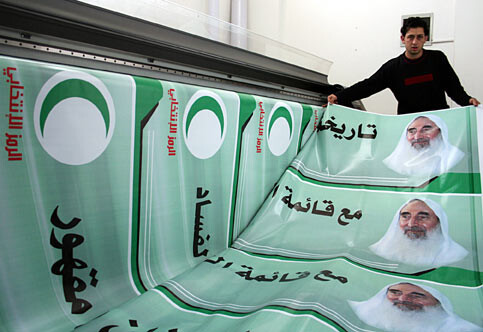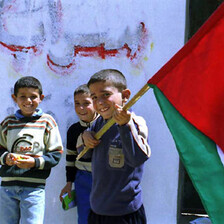The Electronic Intifada 4 January 2006

A Palestinian worker prints election posters for the Hamas movement with pictures of the late spiritual leader Sheikh Ahmed Yassin, in Gaza City, one day before the official start of campaigning for upcoming legislative elections January 2, 2006. (MAANnews/Wesam Saleh)
The word democracy originates from the Greek demokratia: the components of the word being aredemos (the people), kratein (to rule), and the suffix ia. The term means “rule by the people”. In other words, democracy in its ideal sense is the notion that “the people” — in this instance, the Palestinian people - should have control of the government ruling over them. This ideal is pursued by implementing a system of voting whereby the majority of people rule, either directly or indirectly, through elected representatives.
Last week, the Middle East Quartet, consisting of the United Nations, United States of America, Russian Federation and the European Union, called on the Palestinian Authority and the Central Elections Commission to ensure a free, fair and open process in accordance with Palestinian law. However, while the Quartet called for free and fair elections, it also repeated earlier assertions that “those who want to be part of the political process should not engage in armed group or militia activities, for there is a fundamental contradiction between such activities and the building of a democratic State.”
Those who understand the Israeli-Palestinian conflict are aware that there is a military occupation and that Palestinians are holding elections under circumstances that cannot be described as “free”. While the Quartet views elections as “a positive step toward consolidation of Palestinian democracy”, it already demands particular political views of participants: that they “renounce violence”, “recognise Israel’s right to exist”, and “disarm”.
According to the Quartet, the Palestinian cabinet “… should include no member who has not committed to the principles of Israel’s right to exist in peace and security and an unequivocal end to violence and terrorism.” It seems that the Quartet contradicts itself. While it calls for democracy, and free and fair elections, it already defines the Palestinian cabinet, the outcome of the elections and the political views of those who are going to be in the future cabinet.
The Quartet statement also contradicts the conduct and views of certain members.
In a speech delivered at an event marking the 20th Anniversary of the National Endowment for Democracy, a private, non-profit American organisation created in 1983 to strengthen democratic institutions around the world, the US President George W Bush said: “By definition, the success of freedom rests upon the choices and courage of free peoples, and upon their willingness to sacrifice.” He added: “I believe every person has the ability and the right to be free.” The President even said that “governments in the Middle East need to confront real problems, and serve the true interests of their nations.”
The “real problems” in Palestine are all aspects of the occupation and the fact that there is no freedom. The “real problems” also include the fact that previous Palestinian cabinets have not served the true interests of the Palestinian people, namely freedom, democracy and the absence of corruption.
Responding to the remarks made by Bush, the EU foreign policy chief, Javier Solana said: “Both the EU and the US want to increase the number of democracies around the world. We might have different approaches and use different language - the Europeans talk less about advancing freedom - but human rights, good governance and the rule of law go hand in hand with democracy and freedom.”
However, in terms of spreading “freedom” based on “human rights”, in the case of Israel and Palestine, the EU has not been successful. During 2004-2005, the EU has concluded at least two “practical arrangements” with Israeli authorities in order to make it possible for Israel to maintain its internationally unlawful practices while enjoying the benefits of EU-Israel cooperation. The EU may actually have facilitated Israel’s violations of international human rights and humanitarian law by deferring to them in its own dealings with Israel.
According to the European Union’s draft constitution, which is yet to be ratified, the definition of democracy states: “Democracy in its ideal sense is the notion that “the people” should have control of the government ruling over them. This ideal is pursued by implementing a system of voting such that the majority of people rule, either directly or indirectly through elected representatives. Liberal democracies are forms of governance where the fundamental rights of individuals in the minority are protected by law.”
On 7 May 2003, Solana was guest of honour at the Foreign Policy Association’s gala annual dinner in New York, where he received an award for “responsible internationalism.” In his speech he said, “In democracies we cannot afford to ignore our public opinions. In partnerships we cannot afford to ignore our partners. Different voices must be heard and respected, not ostracised or punished.”
In a speech on elections in Lebanon, EU Commissioner for Development, Louis Michel, said in March 2005: “The elections should be held in accordance with a free and fair electoral process, without any foreign interference or influence, and under the sovereign control of the Lebanese authorities.” Untilnow, no European official has said the same about Palestinian elections.
Instead, Javier Solana quickly followed a resolution passed by the US Congress that conditioned future financial aid to the Palestinian Authority on the exclusion of Hamas from the Palestinian elections. In a meeting with Palestinian Minister Mohammad Dahlan on December 18, Solana threatened to curb aid to the PA if Hamas participated in the elections. Ten days later, the Middle East Quartet called for any future Palestinian cabinet not to include members of groups “not committed to Israel’s right to exist.”
These statements demonstrate double standards and counter productivity. Elections are only free and fair when there is no interference from outside powers. Election observers agree that “the will of the people of a country is the basis for the authority of government, and that will must be determined through genuine periodic elections, which guarantee the right and opportunity to vote freely and to be elected fairly.”
The Declaration of Principles for International Election Observation, and its accompanying code of conduct, initiated and recently endorsed by the United Nations Electoral Assistance Division, the NDI, and the Carter Center states:
“Genuine democratic elections are an expression of sovereignty, which belongs to the people of a country, the free expression of whose will provides the basis for the authority and legitimacy of government. The rights of citizens to vote and to be elected at periodic, genuine democratic elections are internationally recognized human rights […] Genuine democratic elections are a requisite condition for democratic governance, because they are the vehicle through which the people of a country freely express their will, on a basis established by law, as to who shall have the legitimacy to govern in their name and in their interests.” — Source: Declaration of Principles for International Election Observation (PDF) 27 October 2005
Moreover, statements from the Quartet, the EU and the US violate international human rights standards, in particular the right of political participation. This right presupposes adherence to fundamental human rights, such as freedom of expression (ie. the non-recognition of Israels right to exist), movement, peaceful assembly and association. The Covenant on Civil and Political Rights states: “Everyone shall have the right to hold opinions without interference. Everyone shall have the right to freedom of expression.” Article 21 of the Universal Declaration of Human Rights states: “Everyone has the right to take part in the government of his/her country, directly or through freely chosen representatives.”
The problem with promoting democracy in Palestine is not that Palestinians do not like democracy; it is that Washington probably would not like the government Palestinian democracy would produce. Assuming that a democratic Palestinian government would better represent the opinions of their people than did the previous cabinets, democratization in Palestinian should produce more critical foreign policy.
The more democratic the Arab world gets, the more likely it is that Islamists will come to power. Even if those Islamists come to accept the rules of democracy, they are unlikely to become the closest allies and supporters of the policy goals of Israel, the EU and the US in the region. Even more striking is the unjustified confidence that Brussels and Washington have in their ability to predict, and even direct, the course of politics in other countries. No administration official would sign on, at least not in public, to the naive view that Palestinian democracy will produce governments that will always cooperate with Israel the way preferred by the US and the EU.
Yet Western democracy advocates seem to assume that Arab democratic transitions, like the recent democratic transitions in eastern Europe, Latin America, and East Asia, will lead to regimes that support, or at least do not impede, the broad range of US and European foreign policy interests. They do not appreciate that in those regimes, liberalism prevailed because its great ideological competitor, communism, was thoroughly discredited, whereas in the Arab world there are other options.
The remarks made by Solana and the Quartet disrupt the genuine democratic process and are an insult to significant sections of Palestinian society. Threatening to curb aid to the PA if Hamas enters the elections is equivalent to threatening a sizeable portion of the Palestinian electorate. What is more disturbing is the means by which this is done — that is, threatening to curb aid to an already impoverished population. It is therefore not surprising that Palestinian political factions across the political spectrum condemned the attempted foreign interference in Palestinian elections. It is clear that the EU and US are not interested in Palestinian democracy nor in free or fair elections. They view democracy and elections only as viable when it serves their own interests. Palestinians should follow their own.
Arjan El Fassed is a co-founder of the Electronic Intifada. In January 2005 El Fassed was an accredited international election observer for the Palestinian presidential elections and was based in the Gaza Strip.
Related Links





